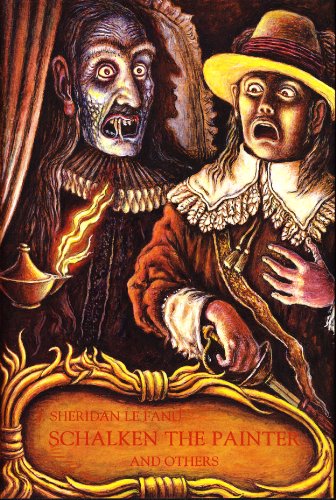Horror and Scarcity: Reading Supernatural Fiction January 20, 2014
Author: Beach Combing | in : Actualite, Contemporary, Modern , trackbackYesterday the postman brought three beautiful volumes of Sheridan Le Fanus’ short stories (Ash Tree Press). They are exquisitely made, not so much books as orgasms between covers, and they have exceptionally good introductions by Jim Rockhill. They were also expensive, particularly once you factor postage to another continent and the Italian’s government’s banditry in putting out random customs charges (the bastards). In fact, the three cost probably twenty times more than a cheap second-hand paperback collection of Le Fanu’s supernatural fiction. So why bother? Well, if you are a casual reader you almost certainly should not, at least not at first: buy one of the old Dover or Wordsworth editions and get to know Le Fanu before you commit. But if you are serious about Le Fanu (and the same principle extends to other horror writers, which is why I’m writing this post) then you swallow hard and you pay. The problem with Le Fanu and horror fiction more generally is essentially this.
1) Horror fiction is not seen as high art (fantasy, SF and detective fiction suffers a similar stigma)
2) Horror writers typically wrote short stories
3) These horror short stories are often scattered across different collections/reviews/journals with overlapping versions and with deliberate and accidental revisions
These three points together mean that a cheap paperback will have thirty percent of the output of a horror author, often prepared badly. For someone wanting to publish everything there is a lot of effort required to gather together the dispersed tales and that effort will not be rewarded commercially, at least not easily. Let’s go back to Le Fanu. Le Fanu wrote many short stories and many novels and some of the short stories have a supernatural setting and some of the novels have supernatural episodes, which can be extracted. But getting from there to a solid collection of his supernatural fiction has proved hellishly tricky. First step you have to track these short stories down, which is not easy because Le Fanu did not always publish with his name: as yet there is only a tentative canon. Second step, you have to deal with the problem that Le Fanu often rewrote stories: which story do you choose, do you produce a hybrid version or do you publish both? Third step, you have to minutely check the text against originals and later revisions. By this time you have spent hundreds of hours in libraries and hunched over the computer. The dream would be to go even further and produce the kind of luscious footnotes for each story found in, say, The New Annotated Sherlock Holmes. Jim Rockhill as editor and presumably Ash Tree decided not to do this: footnotes are expensive and take time and that would have added hundreds of dollars and ten years to the project. And who, frankly, can blame them? The only Le Fanu story to receive this treatment to date has been Carmilla, which had four hundred footnotes poured over it. A word to the wise, there is also potential for an annotated Le Fanu fairy collection…
Holding these three volumes I feel an immense sense of liberation. I’ve had, to date, to read Lefanu tales in six different paperback volumes (some inadequate editions) and I still didn’t have all his supernatural work! Now I can consign all the old volumes to a local charity shop (with a ‘sod you’) and start reading systematically in hard back. But the problem is, as suggested above, not restricted to Le Fanu by any means. Take a new author on Beach’s must read list, Robert Aickman: suggested by a friend of this blog. Aickman wrote a series of supernatural tales spread across several volumes: for an outsider it is all a bit confusing. The cult nature of his fiction means that some of these books are quite expensive, there are no ‘best of’ collections. Here too there is the temptation to plump for the expensive option The Collected Short Stories (in two volumes), published in 2001: in the UK the best buying option that I can find is for 400 dollars! And if you fall in love with Machen, Buchan, Hartley, Blackwood Wheatley or even Lovecraft you will face a similar problem. Yet some of these writers are superlative! Machen, for example, is an exceptional stylist who can beat many modern ‘giants’ into the ground in terms of rhythm and syntax. Le Fanu has a versatility in his prose works shared by no other nineteenth-century writer in English. Yet, good luck if you want to read everything they have written.
With M.R.James it is, incidentally, easy to read everything simply because he wrote so little. I sometime wonders whether to be a really successful as an author you should concentrate on quality over quantity. There are several mainstream authors of great talent – e.g. Iris Murdoch, Ford Maddox Ford… – who made the mistake of creating too large a corpus. What doctoral student wouldn’t quail at having to track down and read almost a hundred FMF titles? Even Dickens diced with death in this respect.



